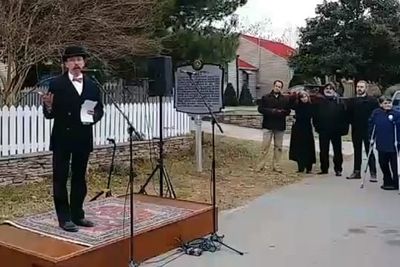A dedication ceremony was held in East Nashville for the first publicly sanctioned historical marker in the state of Tennessee that commemorates the LGBT movement, honoring the work of Penny Campbell. The marker is placed on the 1600 block of McEwen Avenue at the location of Campbell's former residence. She passed away in 2014.
A surprise attendee, Nashville Mayor Megan Barry spoke at the event. "[Penny] was one of the most influential and effective LGBT activists that Nashville has ever seen," she told the attendees gathered for the ceremony. "She said, 'it shouldn't matter who you love and you shouldn't have to hide that love,' and she took that all the way to the Tennessee Supreme Court with our friend Abby Rubenfeld."
Represented by Nashville attorney Rubenfeld, Penny Campbell was the lead plaintiff in the successful Constitutional challenge here in Tennessee that ultimately decriminalized gay sex back in 1996.
"We know of Nashville today as a warm and welcoming place because of people like Penny," Mayor Barry added.
Councilman Brett Withers (photographed at top), who represents the district in which the marker is erected, spoke as well at the ceremony, and he later reflected on this event on Facebook.
[facebook https://www.facebook.com/permalink.php?story_fbid=887677278058277&id=403581996467810 expand=1]
The attorney Abby Rubenfeld, a Nashville LGBT community leader for nearly three decades, also spoke at the event. "Maybe the other old-timers here feel the same way," she said, "but it brings tears to my eyes to see this monument in Nashville, Tennessee, that we're honoring a gay activist."
Rubenfeld spoke with O&AN's Julie Chase later at the reception following the dedication, which took place at the Lipstick Lounge. There, she shared a truly jaw-dropping story about an uncontested divorce, a case in which she represented a gay man, and she shared the comments made later, off the record, by the presiding judge in the case.
"It was a really different world," Rubenfeld said, "and in a certain way I think it's great that younger people nowadays don't know that, and they take for granted the rights they have — you know, maybe they're limited still, but at least we have some rights — but I think it's important that they know from where we came, and appreciate that some people put their lives on the line to make it happen."
